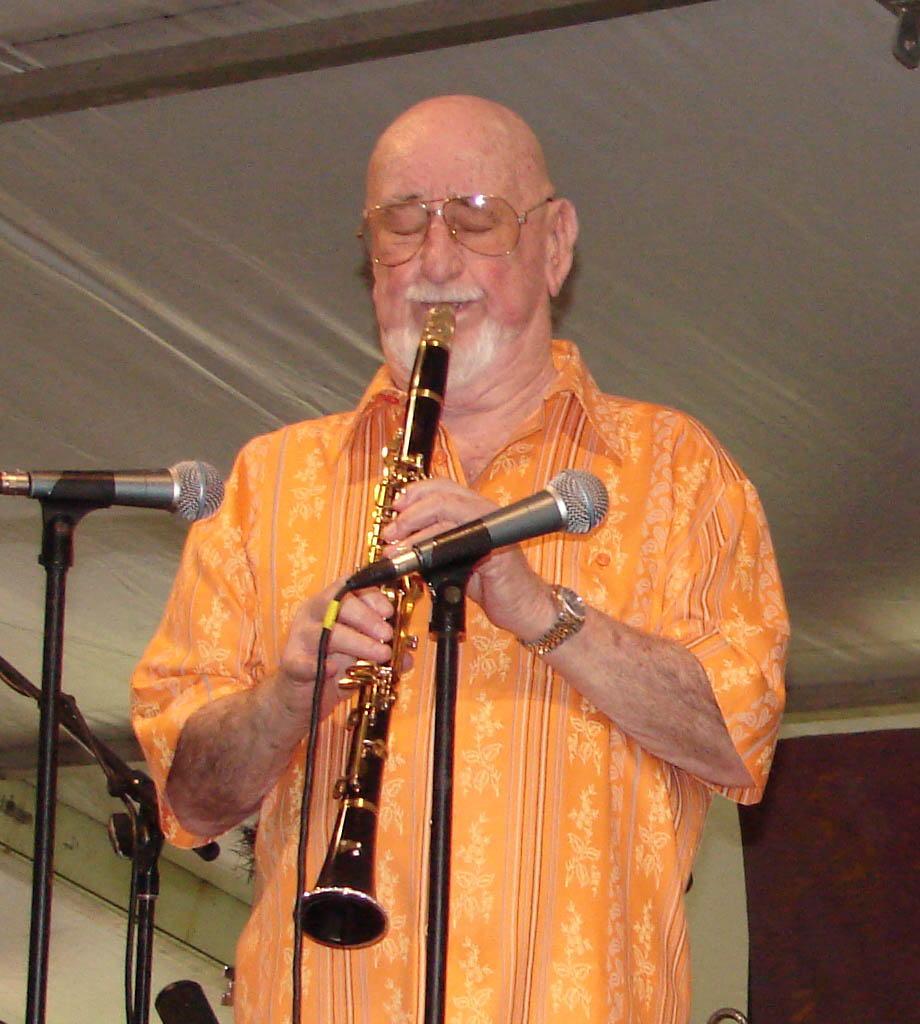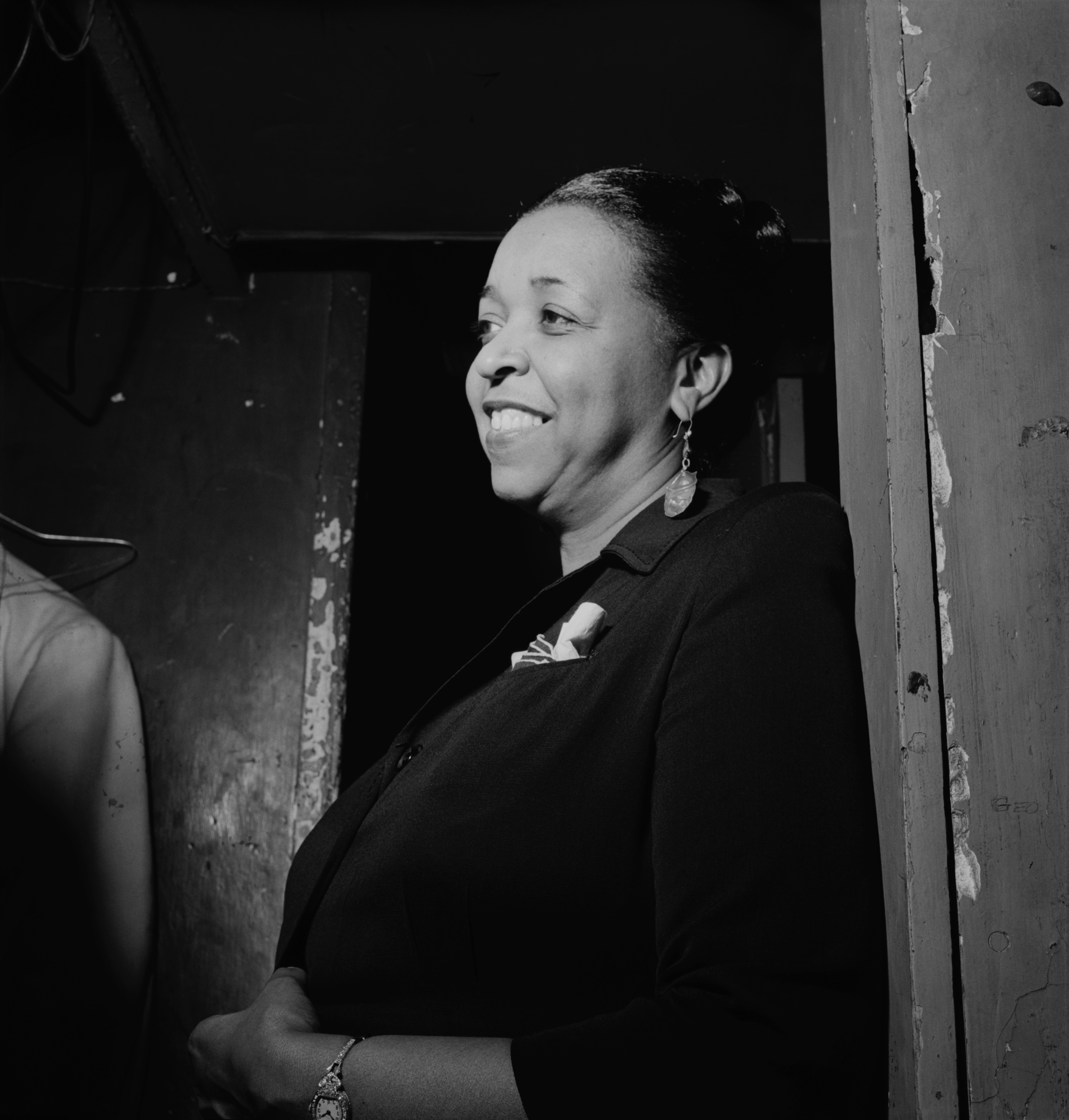|
Johnny Wiggs
Johnny Wiggs (born John Wigginton Hyman, July 25, 1899 - October 10, 1977) was a jazz musician and band leader. Born in New Orleans, Louisiana, United States, Wiggs started his music career on the violin. He soon adopted the cornet and moved to New York City before returning to New Orleans. His main stylistic influences were Bix Beiderbecke and King Oliver, who Wiggs insisted did his best work in New Orleans in the years before he moved up North and was recorded. In the late 1920s he took a job as a teacher in Louisiana and at night played in New Orleans jazz clubs. He made his first recordings as "John Hyman's Bayou Stompers" in the late 1920s. In the 1940s he again became a full-time musician, leading several bands and recording many songs. He used the pseudonym "Johnny Wiggs", as jazz was still looked down on in some circles. He became an important figure in the local traditional jazz revival. In the 1960s he performed part-time, though he remained active until the 19 ... [...More Info...] [...Related Items...] OR: [Wikipedia] [Google] [Baidu] |
George Finola
George A. Finola (5 October 1945 – 1 December 2000) was an American jazz cornetist. Biography Finola played professionally in New Orleans, playing gigs and advancing jazz scholarships most of his life and was an attraction. He founded the Jazz Institute of Chicago and was among the organizers of the first New Orleans Jazz Festival in 1965. He released his debut album ''Jazz Of The Chosen Few'' in 1965, where he is paired with notable musicians like Paul Crawford, Raymond Burke, Armand Hug, Danny and Blue Lu Barker. Discography (in selection) * 1965: ''Jazz Of The Chosen Few'' (Continental Recording And Sound Productions - JM-65-4) * 1975: ''No Words, Just George'' (Meiersdorff Record Productions - MRP1) * 1976: ''New Orleans After Hours'' (Maison Bourbon - MB 4) References External links JIM BRANSON RECALLS GEORGE FINOLA (Nov. 24, 2014)on YouTube YouTube is a global online video sharing and social media platform headquartered in San Bruno, Californ ... [...More Info...] [...Related Items...] OR: [Wikipedia] [Google] [Baidu] |
American Jazz Cornetists
American(s) may refer to: * American, something of, from, or related to the United States of America, commonly known as the "United States" or "America" ** Americans, citizens and nationals of the United States of America ** American ancestry, people who self-identify their ancestry as "American" ** American English, the set of varieties of the English language native to the United States ** Native Americans in the United States, indigenous peoples of the United States * American, something of, from, or related to the Americas, also known as "America" ** Indigenous peoples of the Americas * American (word), for analysis and history of the meanings in various contexts Organizations * American Airlines, U.S.-based airline headquartered in Fort Worth, Texas * American Athletic Conference, an American college athletic conference * American Recordings (record label), a record label previously known as Def American * American University, in Washington, D.C. Sports teams Soccer * ... [...More Info...] [...Related Items...] OR: [Wikipedia] [Google] [Baidu] |
Jazz Musicians From New Orleans
Jazz is a music genre that originated in the African-American communities of New Orleans, Louisiana in the late 19th and early 20th centuries, with its roots in blues and ragtime. Since the 1920s Jazz Age, it has been recognized as a major form of musical expression in traditional and popular music. Jazz is characterized by swing and blue notes, complex chords, call and response vocals, polyrhythms and improvisation. Jazz has roots in European harmony and African rhythmic rituals. As jazz spread around the world, it drew on national, regional, and local musical cultures, which gave rise to different styles. New Orleans jazz began in the early 1910s, combining earlier brass band marches, French quadrilles, biguine, ragtime and blues with collective polyphonic improvisation. But jazz did not begin as a single musical tradition in New Orleans or elsewhere. In the 1930s, arranged dance-oriented swing big bands, Kansas City jazz (a hard-swinging, bluesy, improvisational s ... [...More Info...] [...Related Items...] OR: [Wikipedia] [Google] [Baidu] |
1977 Deaths
Events January * January 8 – 1977 Moscow bombings, Three bombs explode in Moscow within 37 minutes, killing seven. The bombings are attributed to an Armenian separatist group. * January 10 – Mount Nyiragongo erupts in eastern Zaire (now the Democratic Republic of the Congo). * January 17 ** 49 marines from the and are killed as a result of a collision in Barcelona harbour, Spain. * January 18 ** Scientists identify a previously unknown Bacteria, bacterium as the cause of the mysterious Legionnaires' disease. ** Australia's worst Granville rail disaster, railway disaster at Granville, a suburb of Sydney, leaves 83 people dead. ** SFR Yugoslavia Prime minister Džemal Bijedić, his wife and 6 others are killed in a plane crash in Bosnia and Herzegovina. * January 19 – An Ejército del Aire CASA C-207 Azor, CASA C-207C Azor (registration T.7-15) plane crashes into the side of a mountain near Chiva, Valencia, Chiva, on approach to Valencia Airport in Spain, killing all ... [...More Info...] [...Related Items...] OR: [Wikipedia] [Google] [Baidu] |
1899 Births
Events January 1899 * January 1 ** Spanish rule ends in Cuba, concluding 400 years of the Spanish Empire in the Americas. ** Queens and Staten Island become administratively part of New York City. * January 2 – **Bolivia sets up a customs office in Puerto Alonso, leading to the Brazilian settlers there to declare the Republic of Acre in a revolt against Bolivian authorities. **The first part of the Jakarta Kota–Anyer Kidul railway on the island of Java is opened between Batavia Zuid ( Jakarta Kota) and Tangerang. * January 3 – Hungarian Prime Minister Dezső Bánffy fights an inconclusive duel with his bitter enemy in parliament, Horánszky Nándor. * January 4 – **U.S. President William McKinley's declaration of December 21, 1898, proclaiming a policy of benevolent assimilation of the Philippines as a United States territory, is announced in Manila by the U.S. commander, General Elwell Otis, and angers independence activists who had fought a ... [...More Info...] [...Related Items...] OR: [Wikipedia] [Google] [Baidu] |
Pete Fountain
Pierre Dewey LaFontaine Jr. (July 3, 1930 – August 6, 2016), known professionally as Pete Fountain, was an American jazz clarinetist. Early life and education LaFontaine was born to Pierre, Sr. and Madeline, in a small Creole cottage-style frame house on White Street (between Dumaine Street and St. Ann Street) in New Orleans.Fountain, Pete, with Bill Neely, ''A Closer Walk, the Pete Fountain Story'' (Henry Regnery Company, 1972), p. 2-3 Pete was the great-grandson of a French immigrant, François Fontaine, who was born in Toulon, circa 1796, and came to the U.S. in the early 19th century, and died on the Mississippi Gulf Coast circa 1885. Pete's father, a truck driver and part-time musician, changed the family name to Fountain. He started playing clarinet as a child at the McDonogh 28 school located on Esplanade Avenue. As a child, young Pete was very sickly, frequently battling respiratory infections due to weakened lungs. He was given expensive medication but it proved to ... [...More Info...] [...Related Items...] OR: [Wikipedia] [Google] [Baidu] |
King Oliver
Joseph Nathan "King" Oliver (December 19, 1881 – April 8/10, 1938) was an American jazz cornet player and bandleader. He was particularly recognized for his playing style and his pioneering use of mutes in jazz. Also a notable composer, he wrote many tunes still played today, including "Dippermouth Blues", "Sweet Like This", "Canal Street Blues", and " Doctor Jazz". He was the mentor and teacher of Louis Armstrong. His influence was such that Armstrong claimed, "if it had not been for Joe Oliver, Jazz would not be what it is today." Biography Life Joseph Nathan Oliver was born in Aben, Louisiana, near Donaldsonville in Ascension Parish to Nathan Oliver and Virginia "Jinnie" Jones. He claimed 1881 as his year of birth in his draft registration in September 1918 (two months before the end of World War I) but that year is open to debate, with some census records and other sources suggesting 1884 or 1885 as his true year of birth. He moved to New Orleans in his youth. He f ... [...More Info...] [...Related Items...] OR: [Wikipedia] [Google] [Baidu] |
Jazz
Jazz is a music genre that originated in the African-American communities of New Orleans, Louisiana in the late 19th and early 20th centuries, with its roots in blues and ragtime. Since the 1920s Jazz Age, it has been recognized as a major form of musical expression in traditional and popular music. Jazz is characterized by swing and blue notes, complex chords, call and response vocals, polyrhythms and improvisation. Jazz has roots in European harmony and African rhythmic rituals. As jazz spread around the world, it drew on national, regional, and local musical cultures, which gave rise to different styles. New Orleans jazz began in the early 1910s, combining earlier brass band marches, French quadrilles, biguine, ragtime and blues with collective polyphonic improvisation. But jazz did not begin as a single musical tradition in New Orleans or elsewhere. In the 1930s, arranged dance-oriented swing big bands, Kansas City jazz (a hard-swinging, bluesy, improvisationa ... [...More Info...] [...Related Items...] OR: [Wikipedia] [Google] [Baidu] |
Bix Beiderbecke
Leon Bismark "Bix" Beiderbecke (March 10, 1903 – August 6, 1931) was an American jazz cornetist, pianist and composer. Beiderbecke was one of the most influential jazz soloists of the 1920s, a cornet player noted for an inventive lyrical approach and purity of tone, with such clarity of sound that one contemporary famously described it like "shooting bullets at a bell. His solos on seminal recordings such as "Singin' the Blues" and "I'm Coming, Virginia" (both 1927) demonstrate a gift for extended improvisation that heralded the jazz ballad style, in which jazz solos are an integral part of the composition. Moreover, his use of extended chords and an ability to improvise freely along harmonic as well as melodic lines are echoed in post-WWII developments in jazz. " In a Mist" (1927) is the best known of Beiderbecke's published piano compositions and the only one that he recorded. His piano style reflects both jazz and classical (mainly impressionist) influences. All five of ... [...More Info...] [...Related Items...] OR: [Wikipedia] [Google] [Baidu] |







